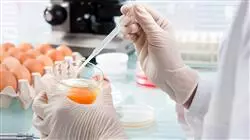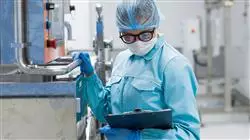University certificate
The world's largest faculty of veterinary medicine”
Introduction to the Program
Join our team of students and become the best in your profession to ensure food safety from primary production"

The Postgraduate diploma in Integrated Food and Beverage Industry Safety Management from TECH Global University is the most complete among those offered in universities at this time because it is aimed at the integrated management of food safety.
Food legislation is a highly relevant aspect prior to the commercialization of any product derived from the food industry. Therefore, this Postgraduate diploma offers the student a broad knowledge of the current regulations concerning food quality and safety, both nationally and internationally.
This training also develops the most important concepts of hazard, risk and safety as applied to the food industry, as well as the most commonly used methods for the control of these hazards, including allergens. It addresses the principles of safety assurance management in the food production industry, using the HACCP plan as a model, its prerequisites, the stages for its implementation and the verification of its efficiency.
Finally, this Postgraduate diploma reviews the general principles of a certification process in an international context, covering aspects such as documentation management, electronic records, audits and other requirements necessary for a successful certification.
The teachers of this Postgraduate diploma are university professors and professionals from various disciplines in primary production, the use of analytical and instrumental techniques for quality control, the prevention of accidental and intentional contamination and fraud, regulatory schemes for food safety certification (Food Safety/Food Integrity) and traceability (Food Defence and Food Fraud/Food Authenticity). They are experts in food legislation and regulations on quality and safety, validation of methodologies and processes, digitalization of quality management, research and development of new foods and finally, the coordination and execution of R&D&I projects. All this is necessary to achieve a complete and specialized training, highly demanded by professionals in the food sector.
It is an educational project committed to training high quality professionals. A program designed by professionals specialized in each specific subject who face new challenges every day.
Do not miss the opportunity to take this Postgraduate diploma in Integrated Safety Management of the Food and Beverage Industry with us. It's the perfect opportunity to advance your career"
This Postgraduate diploma in Integrated Safety Management of the Food and Beverage Industry contains the most complete and up to date educational program on the market. The most important features of the program include:
- The development of case studies presented by experts in veterinary food safety
- The graphic, schematic, and eminently practical contents with which they are created, provide scientific and practical information on the disciplines that are essential for professional practice
- News on Integrated Safety Management in the Food and Beverage Industry
- Practical exercises where the self assessment process can be carried out to improve learning
- Its special emphasis on innovative methodologies in Integrated Food and Beverage Industry Safety Management
- Theoretical lessons, questions to the expert, debate forums on controversial topics, and individual reflection work
- Content that is accessible from any fixed or portable device with an Internet connection
This Postgraduate Diploma is the best investment you can make in selecting a refresher program to update your knowledge in Integrated Food and Beverage Industry Safety Management"
It includes, in its teaching staff, professionals belonging to the field of veterinary food safety, who pour into this training the experience of their work, in addition to recognized specialists from reference societies and prestigious universities.
The multimedia content, developed with the latest educational technology, will provide the professional with situated and contextual learning, i.e., a simulated environment that will provide immersive training programmed to train in real situations.
This program is designed around Problem Based Learning, where the specialist must try to solve the different professional practice situations that arise during the course. For this purpose, the professional will be assisted by an innovative interactive video system developed by recognized and experienced experts in Integrated Food and Beverage Industry Safety Management.
This training comes with the best didactic material, providing you with a contextual approach that will facilitate your learning"

This Postgraduate diploma will allow you to combine your studies with your professional work. You choose when and where to study, as it is 100% online"
Why study at TECH?
TECH is the world’s largest online university. With an impressive catalog of more than 14,000 university programs available in 11 languages, it is positioned as a leader in employability, with a 99% job placement rate. In addition, it relies on an enormous faculty of more than 6,000 professors of the highest international renown.

Study at the world's largest online university and guarantee your professional success. The future starts at TECH”
The world’s best online university according to FORBES
The prestigious Forbes magazine, specialized in business and finance, has highlighted TECH as “the world's best online university” This is what they have recently stated in an article in their digital edition in which they echo the success story of this institution, “thanks to the academic offer it provides, the selection of its teaching staff, and an innovative learning method aimed at educating the professionals of the future”
A revolutionary study method, a cutting-edge faculty and a practical focus: the key to TECH's success.
The most complete study plans on the university scene
TECH offers the most complete study plans on the university scene, with syllabuses that cover fundamental concepts and, at the same time, the main scientific advances in their specific scientific areas. In addition, these programs are continuously being updated to guarantee students the academic vanguard and the most in-demand professional skills. In this way, the university's qualifications provide its graduates with a significant advantage to propel their careers to success.
TECH offers the most comprehensive and intensive study plans on the current university scene.
A world-class teaching staff
TECH's teaching staff is made up of more than 6,000 professors with the highest international recognition. Professors, researchers and top executives of multinational companies, including Isaiah Covington, performance coach of the Boston Celtics; Magda Romanska, principal investigator at Harvard MetaLAB; Ignacio Wistumba, chairman of the department of translational molecular pathology at MD Anderson Cancer Center; and D.W. Pine, creative director of TIME magazine, among others.
Internationally renowned experts, specialized in different branches of Health, Technology, Communication and Business, form part of the TECH faculty.
A unique learning method
TECH is the first university to use Relearning in all its programs. It is the best online learning methodology, accredited with international teaching quality certifications, provided by prestigious educational agencies. In addition, this disruptive educational model is complemented with the “Case Method”, thereby setting up a unique online teaching strategy. Innovative teaching resources are also implemented, including detailed videos, infographics and interactive summaries.
TECH combines Relearning and the Case Method in all its university programs to guarantee excellent theoretical and practical learning, studying whenever and wherever you want.
The world's largest online university
TECH is the world’s largest online university. We are the largest educational institution, with the best and widest online educational catalog, one hundred percent online and covering the vast majority of areas of knowledge. We offer a large selection of our own degrees and accredited online undergraduate and postgraduate degrees. In total, more than 14,000 university degrees, in eleven different languages, make us the largest educational largest in the world.
TECH has the world's most extensive catalog of academic and official programs, available in more than 11 languages.
Google Premier Partner
The American technology giant has awarded TECH the Google Google Premier Partner badge. This award, which is only available to 3% of the world's companies, highlights the efficient, flexible and tailored experience that this university provides to students. The recognition as a Google Premier Partner not only accredits the maximum rigor, performance and investment in TECH's digital infrastructures, but also places this university as one of the world's leading technology companies.
Google has positioned TECH in the top 3% of the world's most important technology companies by awarding it its Google Premier Partner badge.
The official online university of the NBA
TECH is the official online university of the NBA. Thanks to our agreement with the biggest league in basketball, we offer our students exclusive university programs, as well as a wide variety of educational resources focused on the business of the league and other areas of the sports industry. Each program is made up of a uniquely designed syllabus and features exceptional guest hosts: professionals with a distinguished sports background who will offer their expertise on the most relevant topics.
TECH has been selected by the NBA, the world's top basketball league, as its official online university.
The top-rated university by its students
Students have positioned TECH as the world's top-rated university on the main review websites, with a highest rating of 4.9 out of 5, obtained from more than 1,000 reviews. These results consolidate TECH as the benchmark university institution at an international level, reflecting the excellence and positive impact of its educational model.” reflecting the excellence and positive impact of its educational model.”
TECH is the world’s top-rated university by its students.
Leaders in employability
TECH has managed to become the leading university in employability. 99% of its students obtain jobs in the academic field they have studied, within one year of completing any of the university's programs. A similar number achieve immediate career enhancement. All this thanks to a study methodology that bases its effectiveness on the acquisition of practical skills, which are absolutely necessary for professional development.
99% of TECH graduates find a job within a year of completing their studies.
Postgraduate Diploma in Integrated Safety Management of the Food and Beverage Industry
The Postgraduate Diploma in Integrated Safety Management of the Food and Beverage Industry is an essential program for professionals working in the food industry, as food safety is an increasingly important issue in our society. This high-quality and permanently up-to-date program qualifies students in the integral management of food safety, allowing them to understand the most relevant aspects of food safety and the necessary tools for its management. This Postgraduate Diploma provides students with the necessary knowledge about food hazards and their control, the principles of food safety management in the food industry, and the necessary requirements for the implementation of food safety plans. In addition, students will learn hazard analysis and critical control point (HACCP) methods, as well as the prerequisites necessary for plan implementation.
Gain in-depth knowledge of the food industry
The program focuses on current regulations in force both nationally and internationally, allowing the student to understand and apply the legal requirements of food safety in their industry. In addition, the principles of quality management and food safety in the food and beverage industry are addressed, including the prevention of cross-contamination and the control of food allergies. This Postgraduate Diploma in Integrated Safety Management of the Food and Beverage Industry is aimed at professionals in the food industry, such as technicians, quality managers, hygienists, engineers and managers, as well as people who wish to specialize in this area. The program lasts 6 months and is conducted online, allowing students to study at their own pace and schedule. Students who successfully complete this program will be qualified to implement food safety plans and improve the quality and safety of the food and beverages produced in their industry.







